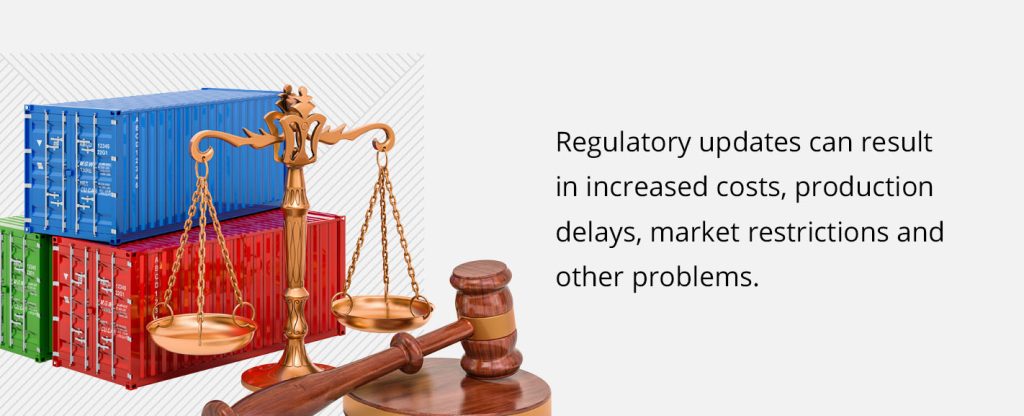

For manufacturers, problems with the supply chain can impact everything from productivity to profitability. Exploring key factors contributing to these disruptions can help your team stay ahead of common hiccups and build stronger, more resilient logistics networks.
We are breaking down what causes supply chain disruptions and potential repercussions for businesses below.
As a manufacturer, proper supply chain management is key to supporting peak operations and meeting customer demands. When disruptions occur, your business may experience the following consequences:
Supply chain issues can overwhelm operations, especially for small- and medium-sized companies. Taking action to improve your supply chain can help mitigate some of these burdens if disruptions occur. Understanding root causes can be a game-changer for businesses like yours, allowing your team to make more informed and strategic decisions.
Every link in the manufacturing supply chain has unique influences on its overall performance. Problems can arise from various external and internal sources. Learn more about what causes supply chain issues below.
The following global economic factors can significantly impact your supply chain:
Severe weather events, from hurricanes to prolonged droughts to tornadoes, can also wreak havoc on the manufacturing supply chain. The direct impacts could be damage to natural resources or supply facilities, causing issues like:
The effects of natural disasters and severe weather can also disrupt transportation routines, exacerbating delays. Examples include halted port operations, flooded roads, damaged bridges, closed airports and blocked railways.
Severe storms can also impact power grids, causing outages that impede everything from production to communication.
Manufacturing is among the top industries impacted by labor shortages. When businesses within your supply chain cannot find enough skilled employees, they may have to:
Fewer skilled workers can also lead to quality control issues and defective products, further impacting production times and processes.
Understaffed teams can be inefficient. In some cases, businesses have to raise prices to accommodate higher pay for their workers as an incentive to attract and retain talent. In other cases, businesses are hiring temporary workers at higher rates, and they may pass along those expenses.
Manufacturing supply chains can also experience disruptions from regulatory changes. These may include new:

Regulatory updates can result in increased costs, production delays, market restrictions and other problems.
Inventory management can significantly impact supply chain efficiency. Unforeseen demand spikes can overwhelm and strain production capacity. Inaccurate forecasting or external events, like natural disasters, can leave manufacturers unprepared for a surge in demand for specific products. Unexpected spikes can lead to stockouts and delays.
Inadequate inventory management practices along the supply chain can also impact reliability. Poor coordination, lack of visibility and ineffective inventory control processes may lead to negative financial and productivity implications.
Technology is a crucial element of the supply chain, and related issues, such as the following, can cause massive disruptions:
Similarly, cybersecurity issues can devastate manufacturing operations. From 2017 to 2023, cyberattacks on the United States supply chain increased by about 58% year-over-year, highlighting the significant threat to businesses.
Cybersecurity-related issues to consider include ransomware attacks, data breaches, phishing attacks and denial-of-service attacks.
Raw material shortages impacting the manufacturing supply chain can be the result of various events, including:
Shortages can halt production, skyrocket costs and lead to other deficiencies.
Various geopolitical factors can create a ripple effect through your business’s supply chain, such as:
Manufacturing businesses can use the Geopolitical Risk Index and Global Supply Chain Pressure Index to gauge potential issues and assess threats for proactive planning.
Transport-related bottlenecks can impact the supply chain by slowing — or halting — the flow of materials or goods due to congestion, capacity constraints or disrupted operations.
Various points in the supply chain can cause slowdowns, including:
Close oversight of transportation routes is key to ensuring shipments arrive on time.
Working with trusted partners is crucial to supporting supply chain optimization. Unreliable suppliers can cause quality control issues, production delays and financial instability for your business.
Ensure you work with a team that prioritizes transparent communication and can handle your production capacity needs. The wrong partner can slow down efficiency and negatively affect your bottom line.
When you need a complete manufacturing partner, turn to the skilled team at PBZ Manufacturing. As a full-service metal manufacturer, our capabilities include design, cutting, bending, fabrication, assembly and more.
We can help your business streamline its supply chain by reducing project completion times and operational expenses. We are a leading metal fabrication and manufacturing company in Pennsylvania with decades of experience. You can experience resourceful manufacturing at every stage in the process.
Are you ready to take the next steps? Contact PBZ Manufacturing to get started today.